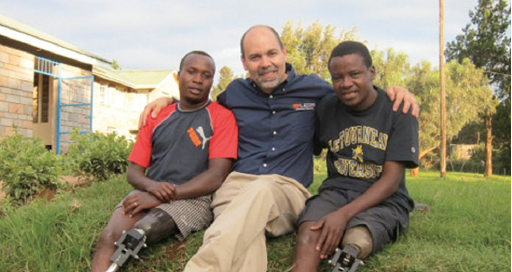The University of Texas at El Paso has joined forces with LIMBS International, a nonprofit organization dedicated to providing ultra low-cost prosthetics for the “poorest of the poor” around the world.
The University’s College of Engineering signed an official agreement with LIMBS that will allow collaboration between the two. The organization’s research and development will operate on campus using the facilities within the new Biomedical Engineering and Bioinformatics Building. Meanwhile, the nonprofit’s headquarters have been relocated from Longview, Texas, to downtown El Paso.

“Our research relationship with LIMBS has tremendous benefits for both organizations, but especially for our students and faculty,” said UTEP President Diana Natalicio. “We will engage in research projects that will help provide sustainable solutions for amputees and address other needs in developing countries. There will be numerous opportunities for students and faculty to make significant advancements in a variety of fields.”
New opportunities for students include research, internships, fellowships and study abroad programs with the nonprofit.
“We are proud to be working in collaboration with UTEP to make significant strides in addressing the problems for amputees in the developing world,” said Roger Gonzalez, Ph.D., LIMBS president and founder. “LIMBS has the proven distribution network to facilitate the research and education benefits this partnership provides.”
According to the organization, there are more than 10 million amputees in the developing world in need of a prosthetic limb that they cannot afford or maintain once they have – which is where LIMBS comes in.
While a typical above-the-knee prosthetic knee for an amputee can cost in the range of $1,000 to $10,000 or more, a “LIMBS” knee costs under $100.
The knee is the flagship product of the nonprofit group and is the only modular prosthetic knee in the world that meets all international standards and can be maintained and repaired locally in the developing world.
“The big thing was, and is, to design and develop prosthetic components that they can maintain and repair,” said Gonzalez, who is also a UTEP professor and director of the Bachelor of Science program in Leadership Engineering. “What happens a lot of times is people give prosthetics components away to these parts of the world and they wear out or break and can’t be repaired or maintained locally. That’s not a long-term or sustainable solution.”
Since its inception in 2003, LIMBS has impacted countries including Bolivia, Kenya, Senegal, Bangladesh and Haiti.
However, the organization does more than simply create prosthetics.
After designing, creating and testing artificial limbs, teams of engineers, prosthetists, clinicians and students travel to third-world countries to educate and train local prosthetists on how to manufacture, fit and repair the devices during week-long certification seminars.
Andrea Almonte, a senior in metallurgical and materials engineering, is one of the many students looking forward to working with LIMBS at UTEP.
“I really like what the program is trying to accomplish and the motivation behind their work,” she said. “I think they’ll benefit me in that I’m working for an organization that is working toward positively impacting the lives of others.”
Almonte will aid the nonprofit in the research and testing of products.
Gonzalez said, “This gives current and future UTEP students, as well as the faculty, the chance to see real-world applications of the work they and others are doing.”
With the help of UTEP, LIMBS hopes to soon develop a prosthetic foot and arm.